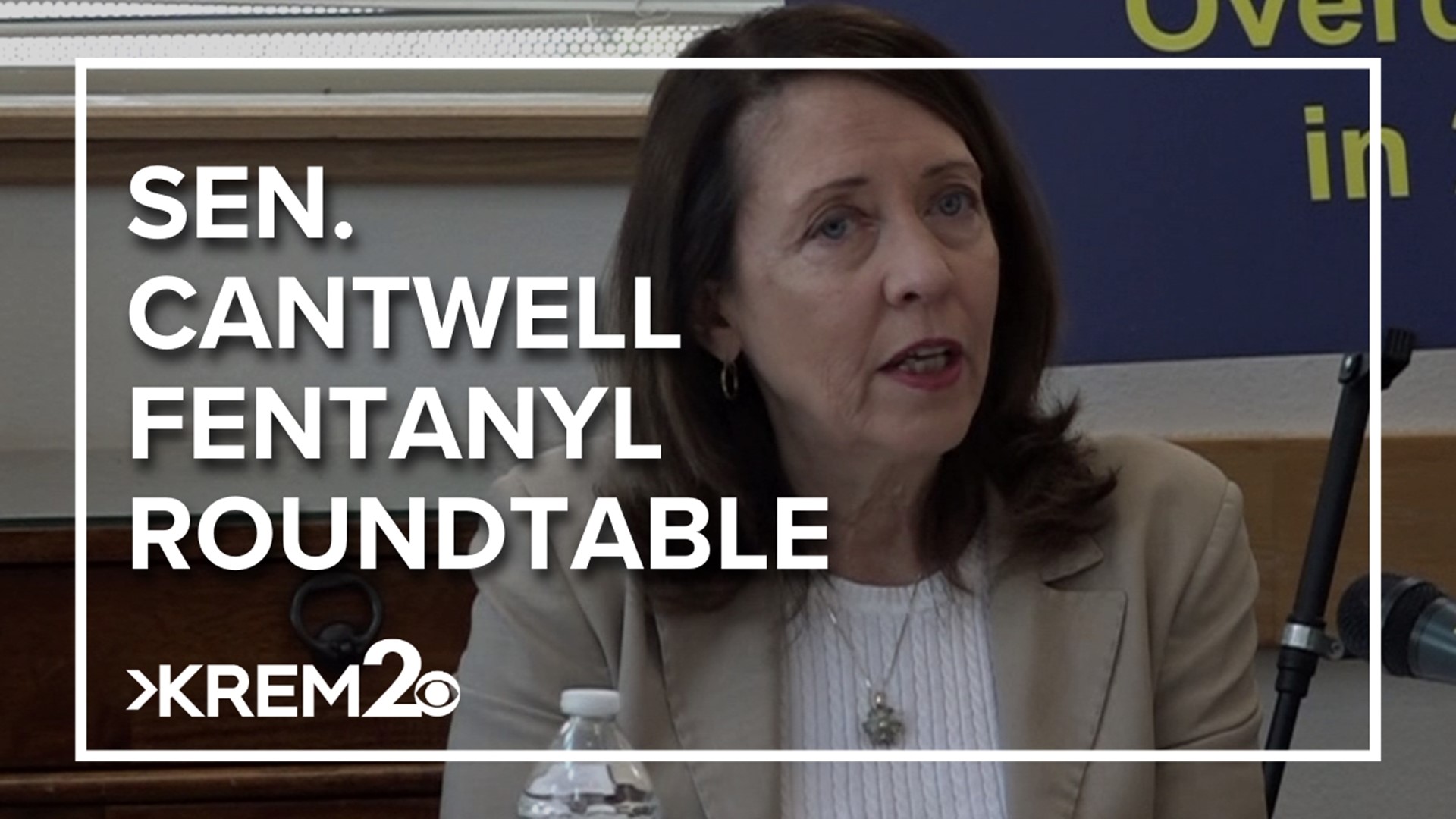SPOKANE, Wash. — Apocalyptic.
Dismal.
Those were just a few of the words used to describe the fentanyl crisis across Spokane County during a roundtable discussion with U.S. Senator Maria Cantwell Monday.
The Washington state representative heard from those who lived through fentanyl's deadly grip and those who provide life-saving treatment during the meeting at The NATIVE Project.
"The first step in fighting this epidemic is knowledge and information," said Dr. Francisco Velazquez of Spokane Regional Health.
Members of Peer Spokane, who say they all lived through active addiction to fentanyl and other drugs, say the opioid has become much stronger and much more prevalent over the years.
"And it got stronger and stronger and it's harder to get off it," said Niki Lovitt, who explained her substance abuse disorder started when she took pills from her grandmother's medicine cabinet.
Others say the opioid takes longer to detox from, sticking around in the body for far longer.
Cantwell has toured four other Washington cities in her fentanyl roundtable discussions, but says from what she heard Monday, Spokane County may have a greater need than most.
"We also have to increase capacity for treatment and that's what we heard here today, that in this part of the state there are not enough resources. In general there are not enough resources but Spokane probably has more need than other parts of the state," she said.
Many treatment service providers told Cantwell a lack of funding is hindering efforts to serve overwhelming numbers in need across eastern Washington.
Maddie's Place provides care for drug-dependent mothers and their babies.
"What we've seen with Maddie's Place is just a lot of hoops to jump through to get our services paid for," said Kim Dunham, director of family advocacy. "We provide free room and board for our moms and we have not received one ounce of funding from our state's Medicaid providers since we opened."
Others say more money could fill eastern Washington's lack of detox beds.
"Every person we come in contact with needs detox," said Shad St. Paul, behavioral health manager for the Spokane Tribe of Indians. "Eastern Washington just does not have enough beds."
Hallie Burchinal with Compassionate Addiction Treatment says her team is "frustrated" with the current restrictions of their sobering center, which only accepts people from the former Camp Hope right now.
"We have people walk in, I'd say 3-4 people every day we could literally walk into a sobering center but we don't have one they can access," she explained.
Burchinal says even with such a specific restriction on the center, they still operate with 9 to sixteen full beds a day.
"If we could waive that 16-bed limit, you think you could see four more people a day?" Senator Cantwell asked.
"Easily," Burchinal said. "Those additional beds would always be full."
Burchinal said it would be optimum to double that bed space to more than 30 available spots.
Cantwell says Medicare may play a role in filling those gaps.
"Communities are telling us if they had more capacity with workforce, with behavioral health, with beds, they could do a lot more to stem the tide," the senator said.
She's also looking at licensing regulations for behavioral health care providers to deal with staffing shortages. Some suggested loosening those educational requirements to allow people with applicable job experience to step into the roles.
"We've gotta get creative, scramble and get hybrid positions in this field," said Toni Lodge, CEO of The NATIVE Project.
Lodge advocates for national licensure that can transfer between states like Idaho and Washington.
Others agree there also needs to be a greater focus on treatment solutions for adolescents and the BIPOC community.
"There's not an adolescent detox bed in this community," Lodge said. "Treatment programs are getting shut down and shut down."
Lodge also highlighted the ease of access of fentanyl, especially for those younger users.
"What I'm so afraid of for my grandson in middle school is kids are selling fentanyl pills from 50 cents to $2 a piece in Spokane," she said. "I'm worried about a kid coming to school with a gun and I'm worried about a kid coming to school with a fentanyl pill."
Spokane County Undersheriff Khris Thompson says distributors are selling fentanyl pills to dealers for about a quarter; he says mandatory minimum sentences for these dealers need to be higher. He said he'd stand by a minimum 10-year prison sentence for anyone dealing fentanyl.
Cantwell hailed the recently-passed Fend Off Fentanyl Act, which enacts stricter sanctions against international trafficking of the drug and money laundering which makes it profitable.
Dr. Velazquez says he'd put Spokane up to launch a pilot project to address the fentanyl crisis with a collaborative approach between the different service providers. He says the discussions are far from over.
DOWNLOAD THE KREM SMARTPHONE APP
DOWNLOAD FOR IPHONE HERE | DOWNLOAD FOR ANDROID HERE
HOW TO ADD THE KREM+ APP TO YOUR STREAMING DEVICE
ROKU: add the channel from the ROKU store or by searching for KREM in the Channel Store.
Fire TV: search for "KREM" to find the free app to add to your account. Another option for Fire TV is to have the app delivered directly to your Fire TV through Amazon.
To report a typo or grammatical error, please email webspokane@krem.com.

